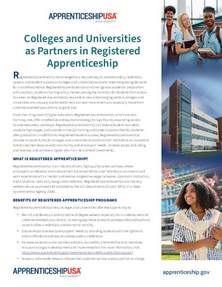Colleges and Universities as Partners in Registered Apprenticeship
Registered Apprenticeship has emerged as a key pathway to postsecondary credentials, careers, and student success as colleges and universities evolve to meet the growing demand for a skilled workforce. Registered Apprenticeships combine rigorous academic preparation with practical, hands-on training with a mentor, easing the transition for students from school to career. As Registered Apprenticeship expands to new and emerging sectors, colleges and universities are uniquely positioned to help connect more Americans, especially those from underrepresented populations, to good jobs.
Post-Secondary Education Success Stories
Discover how local colleges and universities are working with regional and local industry, improving transitions for K-12 students, and forging partnerships across their state to be successful in apprenticeship.
Expand Employer Base
Learn how Harper College expanded on their apprenticeship program footprint
Effective Partnerships
Understand how Macomb Community College developed partnerships
Diverse Talent
Learn about outreach strategies employed at Reynolds Community College
Registered Apprenticeship at Minority Serving Institutions
Registered Apprenticeship can serve individuals who are historically underserved, marginalized, and adversely affected by persistent poverty and inequality by allowing apprentices to earn while they learn. Minority Serving Institutions (MSIs) provide a key pathway to success and opportunity for low-income and first-generation students as well as students of color. As of 2021, there were 797 MSIs across the country, according to the National Center for Educational Statistics. The Office of Apprenticeship partners with the Center for Minority Serving Institutions (CMSI) as a part of the DEIA Registered Apprenticeship Technical Assistance Center of Excellence. CMSI developed a report on the current state of registered apprenticeship across Minority Serving Institutions (MSIs). Learn more about the Office of Apprenticeship’s DEIA efforts on apprenticeship.gov.
Among these MSIs are the Nation's 105 HBCUs located in 20 States, the District of Columbia, and the U.S. Virgin Islands and serving more than 300,000 undergraduate and graduate students. These institutions continue to be important engines of economic growth and community service, and they are proven ladders of intergenerational advancement for men and women of all ethnic, racial, and economic backgrounds, especially African Americans. The White House Initiative on Advancing Educational Equity, Excellence and Opportunity through Historically Black Colleges and Universities (HBCU) calls for Federal Agencies to work in partnership with HBCU leaders, representatives, students, and alumni, to eliminate barriers HBCUs face in providing the highest-quality education to a growing number of students. In response, the Office of Apprenticeship has launched the HBCU Registered Apprenticeship Collaborative. Visit our HBCU RA Collaborative page to learn more.
Registered Apprenticeship is an innovative and time-tested superhighway in the education and workforce development infrastructure, particularly for communities who have been excluded from good jobs for far too long. Good jobs, like Registered Apprenticeships, help develop highly skilled workers and help career seekers launch successful, well-paying careers. Registered Apprenticeship can serve individuals historically underserved, marginalized, and adversely affected by persistent poverty and inequality by allowing apprentices to earn while they learn. The MSIs listed below have launched or joined a Registered Apprenticeship Program. There are 81 MSIs sponsoring Registered Apprenticeship programs. There are 19 HBCU sponsors and training providers (as of March 2024).
MSI Sponsors Key:
- Alaska Native and Native Hawaiian Serving Institutions (AANH)
- Asian American and Native American Pacific Islander-Serving Institutions (AANAPISI)
- Hispanic Serving Institutions (HSI)
- Native American-Serving Nontribal Institutions (NASNTI)
- Predominantly Black Institutions (PBI)
- Historically Black Colleges and Universities (HBCU)
- Tribal Colleges and Universities (TCU)
| MSI Name | MSI Type | Occupations |
|---|---|---|
| Texas Tech University | HSI | Electrician (Alternate Title: Interior Electrician), Plumber, Stationary Engineer |
| The College of the Florida Keys | HSI | Electrician (Alternate Title: Interior Electrician), Heating & Air Conditioning Mechanic & Installer, Plumber |
| The Rural Workforce Academy, Prairie View A&M University (HBCU) | Commercial Drone Pilot, Organic Vegetable Farm Manager, Cyber Security Support Technician | |
| Tohono O'odham Community College | TCU | Carpenter, Electrician, Electrician (Alternate Title: Interior Electrician), Plumber |
| Truckee Meadows Community College | HSI | CNC Operator - Milling and Turning, CNC Set-Up Programmer - Milling and Turning, Industrial Maintenance Mechanic, Industrial Manufacturing Technician, Tool and Die Maker, Tool and Die Maker (Die Manufacturer) |
| United Tribes Technical College | TCU | Accounting Technician (Alternate title: Financial Specialist), Career Development Technician, Customer Service Tech Support |
| University of Arizona | HSI | Electrician (Alternate Title: Interior Electrician) |
| University of Arkansas-Pulaski Technical College | PBI | Heating & Air-Conditioner Install/Ser |
| University of Hawaii at Manoa | AANAPISI, ANNH | Behavioral Health Paraprofessional |
| University of Houston | AANAPISI, HSI | Community Health Worker |


